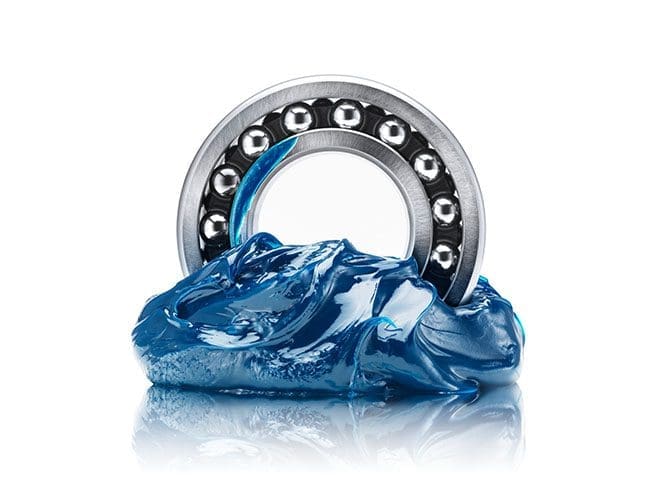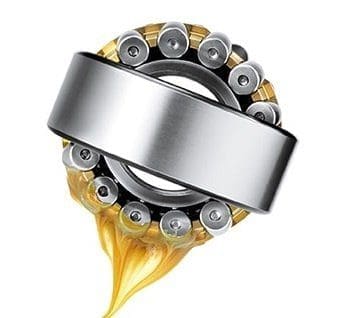 Precise manufacturing is the result of well-running, precision-built machinery, and grease plays a major role in keeping that machinery operating at peak levels. However, grease is often misunderstood and, worse, misapplied.
Precise manufacturing is the result of well-running, precision-built machinery, and grease plays a major role in keeping that machinery operating at peak levels. However, grease is often misunderstood and, worse, misapplied.
Grease is a solid to semi-fluid substance consisting of a thickening agent combined with a liquid lubricant. Grease is typically characterized by its thickening agent. Soap-thickened greases include lithium, lithium complex, aluminum complex, calcium, calcium complex, calcium sulfonate, sodium and barium. Non-soap greases include organo-clay, polyuria and silica. Thickeners make up 3-30-percent of a grease compound.Grease additives can include solids such as molybdenum disulfide, graphite, chalk, carbon black, silica, mica, titanium dioxide and Teflon. They can also include corrosion inhibitors, defoamers, wear reducers, friction modifiers, and load-carrying additives. More exotic compounds can include tackifiers, structural modifiers, VI improvers and other liquid polymers. Grease additives make up 0-15-percent of a grease compound.
Base oils make up the balance of a grease compound (70-90-percent). Base oil determines type of grease, synthetic vs. conventional. Take note, grease compound can be just as complex as a cutting fluid or any other type of lubricant, and choosing the proper grease is critical.
How Grease Works
An oil bath is typically the best way to lubricate moving parts. However, this is not always possible, especially when it comes to machinery. Grease works by suspending oil in a thickening agent and coating the part with the grease compound. Think of it as a “time release” setup. When a part such as a bearing begins to heat up from friction, the oil in the grease compound is released to provide lubrication. The oil and additives have the job of lubricating the part, the thickening agent holds the oil in suspension until it is needed. Once the thickening agent releases the lubricant the grease is “used up,” hence the need to add grease to the part regularly.
Determining The Proper Grease
An equipment manufacturer will specify the proper grease for use in their machine, but knowing why that grease is specified is important and may help identify a misapplication situation. Temperature, load characteristics and thickness are all aspects to consider when choosing the proper grease.
Lithium and Lithium Complex – Lithium and lithium complex greases are the choice for more than 60-percent of grease applications. They exhibit good wash and corrosion resistance, long-term stability and good low-temperature shear performance. With additives, their performance can be tailored to myriad applications.
Calcium and Calcium Complex – Water and wash resistance are key elements of calcium/calcium complex greases. They exhibit high load carrying capabilities and excel at lower operating temperatures.
Aluminum and Aluminum Complex – High-temperature applications typically call for an aluminum or aluminum complex grease. These greases also tolerate water and are suited for high-wash applications. They can be stringy and can stiffen under extended use.
Polyurea – Most commonly found in ball bearing and electric motor applications, Poyurea greases have good high-temperature performance, low compatibility and a small level of corrosion resistance.
Bentonite – In bentonite greases, the oil typically evaporates before the clay (bentonite ) can melt, leading to residue buildup. Bentonite greases are used where the melting of grease is not desired. They are incompatible with other greases.
 Tailoring To The Application
Tailoring To The Application
When choosing a grease, it’s important to know there is no “all purpose” grease. While there are multi-purpose greases, they generally meet the needs of multiple applications within a small window of performance. Greases are often tailored to their given application:
-Higher ambient temperatures may require a harder NLGI grade
-Extremely high temperatures require grease with a high dropping point and higher viscosity base oils
-Low temperatures may call for a softer NLGI grade and/or lower viscosity base oils
-Bearings subjected to high loads require extreme pressure characteristics
-Short duration shock loading typically requires high 4-ball EP characteristic
-Most bearings are subject to long duration and even loading which requires high Timken characteristic
If a grease misapplication situation is discovered, it’s important to determine what type of grease is currently being used. Compatibility issues may dictate the system be cleaned before the proper grease is applied. Like the precision machines they feed, greases are sophisticated lubricants. Knowing your application and the grease it requires is critical to optimum performance.
